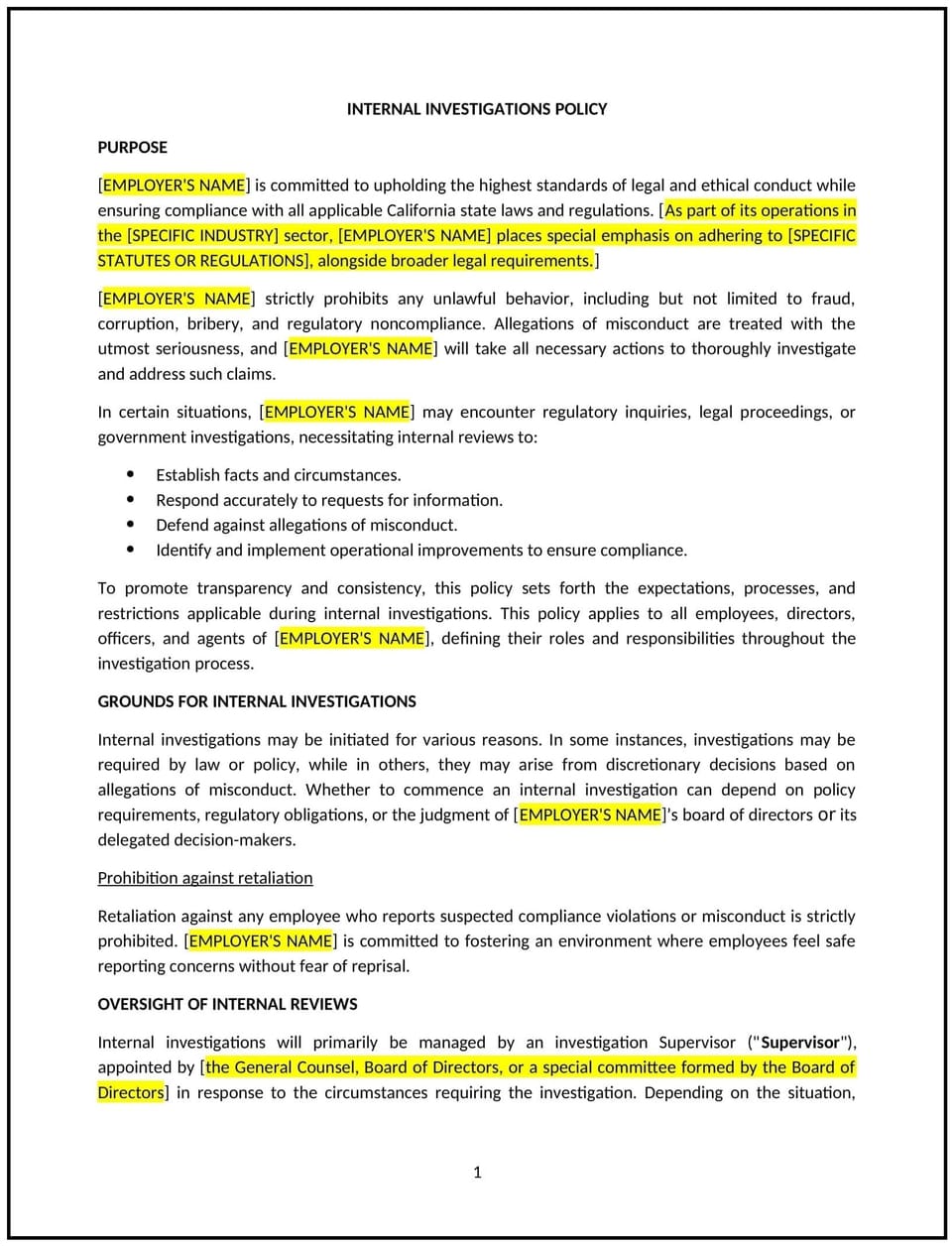Internal investigations policy (California): Free template

Internal investigations policy (California)
In California, an internal investigations policy provides businesses with guidelines for conducting fair, thorough, and compliant investigations into workplace incidents, such as harassment claims, misconduct, or policy violations. This policy supports adherence to California laws, including the Fair Employment and Housing Act (FEHA), which requires prompt and impartial investigations into workplace complaints.
This policy outlines the procedures for initiating, conducting, and concluding investigations while ensuring confidentiality, non-retaliation, and compliance with legal obligations. By implementing this policy, California businesses can maintain a respectful and lawful workplace.
How to use this internal investigations policy (California)
- Define investigation triggers: Specify the types of incidents that may prompt an investigation, such as employee complaints, policy violations, or legal compliance concerns.
- Assign responsibilities: Identify who will lead investigations, such as HR personnel or external investigators, and ensure they are appropriately trained.
- Outline investigation procedures: Provide clear steps for conducting investigations, including gathering evidence, interviewing parties, and documenting findings.
- Ensure confidentiality: Emphasize the importance of maintaining privacy for all parties involved, sharing information only on a need-to-know basis.
- Communicate outcomes: Detail how investigation results will be shared with relevant stakeholders and the steps for resolving issues or taking corrective actions.
Benefits of using this internal investigations policy (California)
This policy offers several advantages for California businesses:
- Supports compliance: Reflects California laws, such as FEHA, by ensuring timely and impartial handling of workplace complaints.
- Promotes fairness: Establishes consistent procedures for addressing incidents, protecting the rights of all parties involved.
- Enhances trust: Demonstrates the business’s commitment to resolving workplace issues fairly and lawfully.
- Reduces risks: Helps prevent legal disputes by documenting thorough and unbiased investigations.
- Encourages accountability: Clarifies roles and responsibilities for investigating and resolving workplace concerns.
Tips for using this internal investigations policy (California)
- Reflect California-specific laws: Ensure the policy aligns with FEHA requirements and other relevant state regulations.
- Train investigators: Provide training on conducting impartial investigations, interviewing techniques, and documenting findings.
- Use external investigators when needed: Engage third-party investigators for complex or sensitive cases to ensure impartiality.
- Document thoroughly: Maintain detailed records of investigations, including evidence, interviews, and conclusions, to support transparency and legal compliance.
- Review regularly: Update the policy to reflect changes in California laws, workplace practices, or industry standards.
Q: How does this policy benefit the business?
A: This policy supports compliance with California laws, ensures fair handling of workplace issues, and reduces legal risks.
Q: What types of incidents are covered under this policy?
A: The policy applies to incidents such as harassment claims, discrimination allegations, policy violations, and other workplace concerns.
Q: How does this policy support compliance with California laws?
A: The policy reflects FEHA and other California regulations, ensuring lawful and fair investigation procedures.
Q: What steps should employees take to report workplace concerns?
A: Employees should follow the reporting procedures outlined in the policy, such as notifying HR or using confidential reporting channels.
Q: How can the business ensure investigations remain impartial?
A: The business can train investigators, use external parties for sensitive cases, and enforce consistent procedures for all investigations.
This article contains general legal information and does not contain legal advice. Cobrief is not a law firm or a substitute for an attorney or law firm. The law is complex and changes often. For legal advice, please ask a lawyer.


